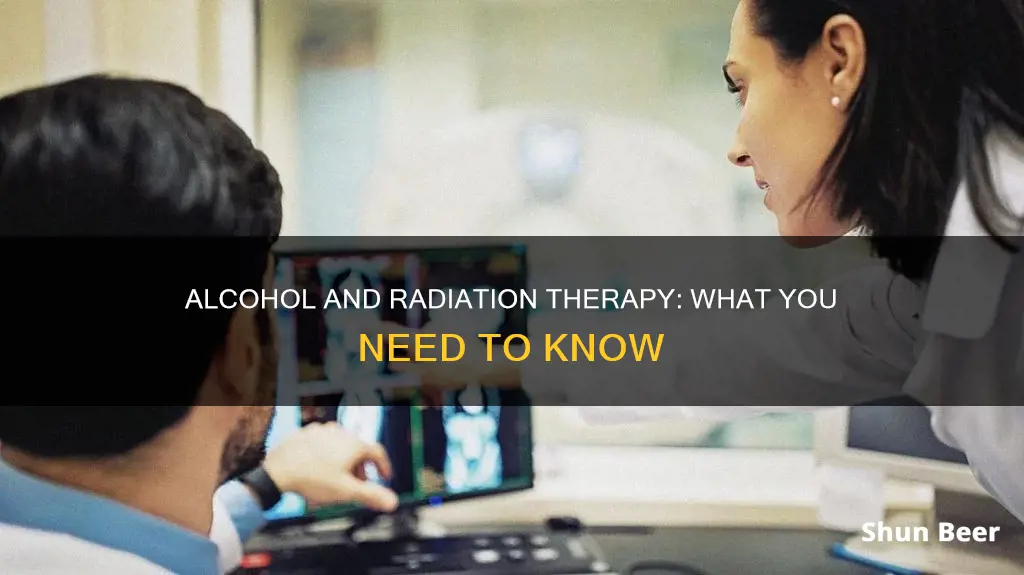
Alcohol is a known carcinogen, and drinking it while undergoing radiation treatment for cancer is generally not recommended. Alcohol can irritate the mouth and stomach, and for patients with blood and bone marrow cancers, it can interfere with the healthy production of white blood cells, red blood cells, and platelets. It can also worsen the side effects of cancer treatments, such as fatigue and nausea, and cause liver inflammation. However, some people may be able to consume small or moderate amounts of alcohol during their treatment, depending on the location of the treatment. It is important to discuss alcohol consumption with your doctor or healthcare provider to determine what amount, if any, is acceptable during your treatment.
What You'll Learn
- Alcohol can worsen side effects of radiation treatment, like a sore mouth or sensitive digestion
- Alcohol can cause tissue damage, inflammation, and liver inflammation
- Alcohol can increase the risk of recurrence for cancer survivors
- Alcohol can interfere with healthy production of white blood cells, red blood cells, and platelets
- Alcohol can cause irritation and be physically uncomfortable if you're undergoing radiation to your head, neck, throat, oesophagus or stomach

Alcohol can worsen side effects of radiation treatment, like a sore mouth or sensitive digestion
Alcohol and Radiation Treatment: What You Need to Know
Undergoing radiation treatment for cancer can be a challenging experience, and it's understandable to want to unwind with a drink. However, it's important to know the potential risks of consuming alcohol during this time. While small or moderate amounts of alcohol are usually acceptable during radiation treatment, excessive drinking can worsen certain side effects and impact your overall health. Here's what you need to know about how alcohol can affect your radiation treatment:
Sore Mouth or Sensitive Digestion
Alcohol can irritate the lining of your mouth, throat, and gastrointestinal tract. If you're experiencing a sore mouth or sensitive digestion as side effects of radiation treatment, drinking alcohol can significantly worsen these symptoms. Radiation treatment to the head, neck, or stomach can cause these issues, and alcohol will only add to the irritation and discomfort. It's best to avoid alcohol completely if you're undergoing radiation therapy to these areas.
Liver Health
Alcohol is metabolized by the liver, and excessive drinking can cause liver inflammation and even permanent damage. Many chemotherapy drugs are also processed by the liver, so drinking alcohol during radiation treatment can put additional stress on this vital organ. This, in turn, can impair the breakdown of chemotherapy drugs and increase their side effects.
Fatigue
Radiation treatment can make you feel tired, and alcohol can compound this fatigue. Alcohol acts as a sedative, and when combined with the effects of cancer treatment, it can exacerbate feelings of exhaustion. If you're already battling fatigue due to your cancer or treatment, consider avoiding alcohol to help maintain your energy levels.
Nausea and Mouth Sores
If you're experiencing nausea or mouth sores as side effects of radiation therapy, alcohol can make these problems worse. Alcohol irritates the lining of the stomach and gastrointestinal tract in a similar way to radiation therapy and chemotherapy. Therefore, it's advisable to avoid alcohol if you're dealing with these challenging side effects.
Bone Marrow Function
Alcohol can interfere with the healthy production of white blood cells, red blood cells, and platelets in your bone marrow. For patients with blood and bone marrow cancers, radiation therapy already strains bone marrow function. Adding alcohol to the mix can further damage the bone marrow and have more serious consequences.
In conclusion, while small amounts of alcohol may be acceptable during radiation treatment, excessive drinking can worsen side effects and impact your overall health. It's crucial to discuss alcohol consumption with your healthcare team during radiation treatment. They can provide personalized advice and help you make informed decisions about alcohol intake based on your specific condition and treatment plan.
Drinking Beer at the Park: Is It Legal?
You may want to see also

Alcohol can cause tissue damage, inflammation, and liver inflammation
Alcohol can have a detrimental impact on your body's ability to undergo radiation treatment for cancer. This is due to alcohol's tendency to cause tissue damage, inflammation, and liver inflammation, which can interfere with the treatment's effectiveness and success.
Alcohol consumption can interfere with the healthy production of white blood cells, red blood cells, and platelets in your bone marrow. For patients with blood and bone marrow cancers, such as leukaemia, lymphoma, and myeloma, radiation therapy already strains the bone marrow. Adding alcohol to the mix can make the situation more severe and critical.
Alcohol is processed by the liver, and excessive drinking can lead to liver damage. Since many chemotherapy drugs are also excreted by the liver, drinking alcohol during treatment can put additional stress and cause potential permanent damage to this vital organ.
Alcohol can also cause inflammation in the body, particularly in the gastrointestinal tract. This inflammation can lead to irritation and discomfort, especially if radiation therapy is being applied to the head, neck, throat, oesophagus, or stomach.
The effects of alcohol on tissue damage, inflammation, and liver inflammation can interfere with the success of radiation treatment and worsen the side effects of cancer treatments. Therefore, it is generally recommended to avoid alcohol consumption during cancer treatment.
Post-Surgery Drinking: Non-Alcoholic Beer, Safe or Not?
You may want to see also

Alcohol can increase the risk of recurrence for cancer survivors
Alcohol is a well-known carcinogen that increases the risk of cancer and cancer recurrence. It is linked to a higher risk of cancers of the mouth, throat, voice box, and esophagus, as well as liver, colon, rectal, and breast cancer. Even small amounts of alcohol can increase the risk of certain cancers, such as breast cancer.
Alcohol use during cancer treatment can have several negative impacts. Firstly, it can interfere with the healthy production of white blood cells, red blood cells, and platelets in the bone marrow, which is particularly important for patients with blood and marrow cancers. Alcohol can also worsen side effects such as fatigue and irritation to the stomach and gastrointestinal tract, especially for those experiencing nausea as a result of radiation therapy. Additionally, alcohol is metabolized by the liver, and drinking can cause additional stress and possible permanent damage to this organ.
For these reasons, it is generally recommended to limit or avoid alcohol intake during cancer treatment, especially for those undergoing radiation therapy to the head, neck, throat, esophagus, or stomach, as alcohol can cause irritation and discomfort in these areas. However, for those receiving radiation therapy to other parts of the body, drinking in moderation may be approved by a specialist.
While the effects of alcohol on cancer recurrence risk after completion of cancer treatment are largely unknown, it is important to discuss this with your doctor. Factors such as your risk of recurrence, type of cancer, and other possible health effects of drinking should be considered.
In summary, alcohol can increase the risk of cancer recurrence, and it is important for cancer survivors to discuss their alcohol consumption with their healthcare team to make informed decisions about their health.
Beer and Running: What's the Deal?
You may want to see also

Alcohol can interfere with healthy production of white blood cells, red blood cells, and platelets
Alcohol can have a detrimental impact on the healthy production of white blood cells, red blood cells, and platelets in the bone marrow. Here's how:
Firstly, alcohol can cause generalized suppression of blood cell production in the bone marrow. This means that the bone marrow, which is responsible for creating new blood cells, is hindered by alcohol consumption. As a result, individuals may experience a reduced number of white blood cells, leaving them more vulnerable to infections. A decrease in red blood cells can lead to anemia, resulting in fatigue, shortness of breath, and lightheadedness.
Additionally, alcohol interferes with the production and function of white blood cells, particularly those that defend the body against bacterial infections. This interference increases the risk of bacterial infections. Alcohol also adversely affects platelets and other components of the blood-clotting system, such as clotting factors. This interference can lead to a higher risk of bleeding and strokes.
Moreover, alcohol can cause the destruction of both white and red blood cells, further compromising the body's defenses. Alcohol also affects the bone marrow directly, causing toxic effects that can result in abnormal blood cell precursors that cannot mature into functional cells. This can lead to defective red blood cells that are destroyed prematurely, contributing to anemia.
Lastly, alcohol can interfere with the absorption of essential nutrients, such as iron and folic acid, which are crucial for the production of healthy blood cells. This interference can further exacerbate the negative impact on the production of white blood cells, red blood cells, and platelets.
Beer Blues: Bad Brews Make You Sick?
You may want to see also

Alcohol can cause irritation and be physically uncomfortable if you're undergoing radiation to your head, neck, throat, oesophagus or stomach
Alcohol and Radiation Treatment
It depends on the location of the treatment. If you are undergoing radiation to your head, neck, throat, oesophagus, or stomach, it is recommended that you abstain from alcohol. Alcohol can cause irritation and be physically uncomfortable in these areas.
Radiotherapy to the head and neck area can cause a sore or dry mouth, difficulty swallowing, and changes in taste. Alcohol can irritate the mouth and throat, worsening these side effects. It can also cause inflammation in the mouth and throat, making it physically uncomfortable.
Alcohol can interfere with the healthy production of white blood cells, red blood cells, and platelets in your bone marrow. It can also impact your sleep and add to the sedative effects of any medications you are taking for pain or nausea. If you are experiencing nausea as a side effect of radiation therapy, alcohol can irritate the lining of your stomach and gastrointestinal tract, worsening this side effect.
It is important to discuss your alcohol use with your doctor or healthcare provider. They can advise you on whether it is safe to drink alcohol during your treatment and, if so, how much is acceptable. Be honest about the amount you consume so they can help you make any necessary adjustments to your drinking habits.
Beer and Creatine: Mixing Alcohol and Supplements
You may want to see also
Frequently asked questions
It is generally recommended to limit alcohol intake during cancer treatment, but small or moderate amounts are usually fine. However, if you are undergoing radiation to the head, neck, throat, oesophagus, or stomach, you should abstain from alcohol as it can irritate these areas and be physically uncomfortable.
Alcohol can cause or worsen irritation to the lining of the stomach and gastrointestinal tract, as well as the mouth, especially if you have mouth sores. It can also interfere with the healthy production of blood cells and platelets in the bone marrow. Additionally, alcohol can make fatigue and nausea worse, and it may negatively interact with medications.
Moderate drinking is defined as no more than one drink per day for women and no more than two drinks per day for men. One drink is defined as 1.5 ounces of 80-proof distilled spirits, 5 ounces of wine, or 12 ounces of beer.
Alcohol intake by cancer survivors has been shown to increase the risk of recurrence. Therefore, limiting alcohol consumption to the recommended amount or less is important for reducing long-term cancer risk.







